- Home
- Diana Wynne Jones
The Merlin Conspiracy Page 11
The Merlin Conspiracy Read online
Page 11
I think Grundo was very frightened. He says my face was gray and my eyes like bright holes. He said, “Are you all right?” in the calm, quivery voice people use instead of screaming. When I didn’t answer, and I couldn’t—all I could make was a queer, buzzing moan—he took a violent hold on my wrist and dragged me out of the long-ago village. He had to drag very slowly because I almost couldn’t walk. My right thigh felt broken.
Down the flowery field we crept to the wood with the river in it. Grundo had to carry both our bags. He was probably wondering how we were going to get back to the manse. His first idea was to sit me down in the wood to recover, but that didn’t work because my leg hurt too much to bend. So he cut through the dark corner past the waterfall and dragged me across the stepping-stones and out onto the hillside beyond.
There it was as if we had passed an invisible boundary. The hurt in my hip stopped. It was just not there anymore. “Oh, thank goodness!” I said. “Fancy being in that kind of agony all the time, Grundo!”
“Are you all right now?” he asked rather desperately.
“No,” I said. My head seemed to be bursting, as if it had two brains in it. “I’m sorry,” I said. “I shall have to lie down and go to sleep for a bit.” And I flopped down on the grass and heather and more or less passed out.
Grundo says I slept for at least two hours. He sat anxiously beside me the entire time, not knowing what had happened to me and wondering what he would do if I never woke up again. He says I hardly seemed to be breathing most of the time. He told me very calmly, but I think he had been pretty brave.
I woke up suddenly—pop, like that—and sat up with all sorts of strange new knowledge still sorting itself out madly in my mind, to find the sun quite low and both of us under a cloud of midges.
“Are you better now?” Grundo asked with great calmness. He was trying to scratch both legs, one arm, and his hair at once, and he looked unusually pink and sweaty.
“Yes,” I said. “Starving. Is there any food left?”
Grundo scrambled to tip sandwiches, cake, and apples out of our bags. “Tell me what happened,” he implored me.
I tried to tell him, while eating passionately. The odd thing was that I couldn’t tell him what it was really like. I could only tell him what I’d learned. “The woman who used to live in that house,” I explained, “was a wizard and a priestess and a healer, a very strong one, very clever. She understood more about magic than anyone I’ve ever met. And—”
“But you didn’t meet her,” Grundo objected. “There was no one but us in that ruin.”
“Yes, I did,” I said. “She was lying in the place where the butterflies were.” I saw her in my mind’s eye as I said this, even though I knew Grundo was right and she had not been there. She was quite small and thin, very brown and rather wrinkled, and I could tell she thought of herself as old—but she wasn’t, not even as old as Mam, and Mam is thirty-two, which is not old for people these days. She had hair like mine, black and curly, but hers was long and wild and a little greasy. And she stared up at me in bitter gladness, from the biggest, darkest, most vivid eyes I have ever seen. Her dry brown mouth smiled, in spite of her pain. I felt as if I had known her for years and talked to her for months. She was that strong.
“She had bad teeth,” I added. “The point is that her village tried to own her. The headman broke her hip to keep her and her magic with them when she was fifteen and wanted to marry a man from over the hill. So she never married. She could hardly walk. And she hated them for it. And, although she did her duty strictly, and cured their diseases and warded them with magic and made their crops flourish and dealt with their enemies, she made a vow to herself that she would learn more magic than anyone else in the world and not tell anyone else in the village one syllable of what she learned. Her assistants were all stupid anyway. They couldn’t understand any magic deeper than wart charming if they tried. But the trouble was, the rule is that you have to hand on your magical knowledge to someone or it stays around and destroys things. So she learned and kept everything in her head, and when she knew enough, she searched all through the future to find someone to give the knowledge to. That’s what Grandfather Gwyn sent me here for. So that she could find me.”
“And do you know everything she knew?” Grundo asked. He sounded so disbelieving that I knew he was deeply impressed.
“Not yet,” I said. It was unfolding in my head as I talked. I had a notion that I would be unfolding more of it for the rest of my life. “She gave it to me in a lump, you see, along with her bad hip for a while. It’s all in lists, like files in a computer. Each file goes under a different flower. I think I’m supposed to learn which flower means which sort of magic and then access them when I need them. Lots of them are going to just sit there folded into a lump until I call them up. But I know some. Purple Vetch is the first file, and that has all the time magic in it, the stuff she needed to be able to search the future. And some really strange things!” I stared at these things, while Grundo stared at me staring into distant universes and huge, peculiar ideas I’d never thought of before. It was like looking down a whirlpool.
“Why did she choose you?” he growled. It was almost a complaint. Grundo felt left out.
“I think my brain matches hers,” I said. “That’s what she looked for, a brain, not a person. But she was glad I was well intentioned, too. She was going to die soon. Her hip had gone bad inside. And she really didn’t tell anyone in the village her magic, I know. I’m pretty sure the place didn’t last very long after she died. But I remembered to thank her. I told her that her knowledge was going to save more than just a village in this time.”
“And will it?” Grundo asked eagerly. “Can you out-magic the Merlin now?”
I wondered. There was certainly stuff in my head that would do that, but you had to learn what it was and how to work it first. “If I think very hard …” I said. “Let’s walk back to the manse now. I still have to sort out just what I do know.”
All the way back, in the mild evening sun, I was thinking, thinking. I kept discovering new flower files I hadn’t noticed before, each with more knowledge stacked inside it than I had ever dreamed existed. Once or twice I annoyed Grundo by bursting out laughing. The first time was when I realized that all the magic we had learned at Court was small and one-sided and incomplete. The reality was huge, and all the things our teachers said were complicated were really quite simple. And the other way round.
“Oh, good!” Grundo grunted when I told him. “I’ve always thought that.”
Another time I laughed, I had to explain to him, “It was the kind of woman she is! Almost all the flower headings are dry, twisty kinds of plants, like thistles or brambles or teasels. Or gorse. That’s a big file. There’s not a juicy dandelion or a lily or a forget-me-not anywhere! She was so dry and bitter!”
“It’s not evil magic, is it?” Grundo said anxiously.
“No,” I said. “That’s the odd thing! You’d think the way she hurt and hated, she might use bad magic, but she didn’t. There are several evil files—privet, yew, ivy—but they’re made like read-only. For reference, so you know what to do when someone uses black magic against you, and they all have the counterspells with them, which are the only active ones. All the rest is just, well, clean knowledge. I don’t know how she did it, considering the life she had!”
I kept having memories of that pain she’d lived with, like long, blunt teeth clamped on the top of her leg, and she still did her duty and kept her magic white. It was enough to make me swear to be worthy of her gift, to use it properly or not at all.
My grandfather was outside the manse when we came round the last bend in the way, like a stick of charcoal on the grass in front of the house, watching for us. He did not move as we came across the top of the valley, except to take down the hand that was shading his eyes. When we came up to him, he said, “There is no need to tell me. I see you found what you went for. Tea is ready.”
As we f
ollowed his upright black back into the manse, it came to me that Mam must often have been hurt or offended when he behaved like this. I wondered if I was. And I found I wasn’t. It was his way. He had shown he was anxious by waiting outside for us. When he saw we had succeeded and that we were all right, he felt words were unnecessary because we all knew anyway. I wondered if I would ever be able to explain this to Mam. Or if she would believe me if I did.
Tea was magnificent again. I let Grundo enjoy himself and chat to Grandfather Gwyn and did not speak much myself. My head was still heavy and fuzzy with all that had been packed into it. Afterward I left Grundo looking at books in the tall, damp-smelling parlor and toiled away to bed. I suppose I undressed. I was in nightwear next morning. But all I remember is plunging into sleep.
TWO
I slept very heavily. It was the kind of sleep people describe as “dreamless,” except that it wasn’t. All through it I felt that knowledge was unfolding in my brain. Then, around midnight, I seemed to have a dream.
I thought I lifted my head from my pillow because the bell in the little chapel was ringing. “I must go and see,” I said to myself, “but I’m not used to this and I hope I get it right.” So, while the small bell kept tolling out its silvery ting, ting, ting, I sorted sleepily through my new knowledge and used it to float out of bed and through the window, where I sort of hovered round to the front of the manse. Everything was dark and gusty out there, but there was somehow enough gray light to see by. I could see that the arched door at the front of the chapel was open. People in dark clothes were coming out of the darkness inside it, riding horses, or riding other things much stranger, and coming slowly uphill in threes and pairs toward the manse.
There must have been a good fifty of them on their way by the time the chapel bell gave a final tong-ting and stopped. Their pale faces lifted expectantly then. My grandfather came out from behind the manse, riding the gray mare. He was not in his cassock, but all in black, tight-fitting clothes, except for his silky cloak, which had a white lining that billowed around the dark shape of him.
He spoke to the advancing people in the thunderous voice he used when he said grace. “I am summoned,” he said, “but for no good purpose. Come.”
He rode the gray mare straight forward, straight off the edge of the grass and into the air above the winding valley, and the other people followed him in a dark procession.
I had a moment when I knew this had to be a dream and then another moment when it was fairly clear to me that my grandfather was not just a mere wizard. Then I was speeding after them through the air.
It was certainly like a dream for a short while. Blue-dark landscapes rushed underneath us, mountains heaved up, pale roads and glinting rivers coiled, black woodland swept up and swept behind, and every so often the clear yellow lights in houses flitted by far below. Those lights were like heaps and strings of jewels, and I got the feeling they were equally precious. But we did not stop for them or for anything else, even for the small flier that blundered across our way, chugging and roaring and no doubt full of people hoping they were imagining the sight of us, until we came to the dim shape of a castle on a knoll beneath. Then we swept down and around it in a grand curve, and my grandfather rode down the air to land on the turf inside the castle gardens.
I recognized the place as we came down, mostly because of the huge orderly cluster of tents, lorries, and buses just outside the gardens to the right. This was Castle Belmont, where the King’s Progress was camped.
But we were not going to the camp. My grandfather led his riders silently on through the parkland until they came to the dark walls of the Inner Garden. There, at its gate, he turned and led them, much more swiftly, around outside its walls. I knew, for some reason, that this part was not my concern. I sat hovering in the dark air and watched while they circled the garden three times clockwise, faster and faster. My grandfather was always easy to see, on the white mare with the white lining of his cloak flapping and gleaming, so that on the second circuit it was easy to see that he was now carrying some kind of pale banner or standard. On the third circuit, most of the riders following him were carrying pale lights that bobbed and glimmered as they swept up to the gates, swept around in a great curve, and went noiselessly galloping and glinting round the walls in the opposite direction.
My innards gave a lurch at this, because this was widdershins. All that I had been taught by the teachers at Court said that this was the direction of bad magic. But the knowledge that was now in my head from the woman with the hurt hip reassured me about this. My grandfather was one of the few who were outside these rules, and the gates of the garden would not open to him until he had circled three times counterclockwise as well.
Sure enough, on the third reappearance of the speeding procession, the gates sprang apart, and the riders trotted sedately inside. They were not completely silent now. As I swooped down to follow them, I could hear thudding, and faint creaks and jingles from their harness, and the horses snorting as they recovered from the gallop.
I overshot them a little. I was not used to floating about bodiless. There was a tiny flickering among the bushes up beyond the first lopsided pool, and I assumed that was where the riders would be. But what I found there was a double ring of lighted candles. Sybil, Sir James, and the Merlin were standing in strange attitudes inside it. The Merlin had his arms raised and bent as if he were pushing against a low ceiling.
“It’s coming—coming at last!” he panted.
Sybil, who seemed to be heaving at an invisible rope, gasped, “I hope it’s quick, then. It’s all I can do to hold it!”
Sir James didn’t speak. His was the weakest magic, and it was clearly all he could do to keep up his part of the working. The candles glistened on his sweaty face and clutching hands.
The gray mare climbed the bank beside me and stopped. My grandfather sat on her back, staring at the three magic workers with his face blank as marble and utterly scornful. “I am here,” he said.
The three inside the ring of candles relaxed and puffed out great thankful breaths. “It’s here,” said the Merlin.
“Thank goodness!” said Sybil. “It took its time!”
Sir James, bent over, with his hands on his knees, gasped out, “They do, the big ones. Owe it to their pride, you know.”
None of them looked toward my grandfather. I realized that they were unable to see him.
“You have summoned me,” said my grandfather, “and had the temerity to bind me to your will. I hereby warn you that you are permitted to summon me three times only. You can bind me no further than that.”
“It may be speaking,” the Merlin said, with a strained, listening look. “Wasn’t that some kind of protest?”
“Oh, they always grumble, these strong Powers,” Sir James cut in irritably. “Not used to bending their heads. Get on and instruct it, Sybil. I’m whacked.”
I suppose I should have stayed to hear what Sybil was going to say. I wish I had now. But a great disgust took me. I felt quite sick that these three unpleasant people should summon my grandfather and call him “it” and give him orders, when they couldn’t even see him and could barely hear him either. Besides, there was quite a bit of noise coming from the greensward near the gate where the other riders were, and I was curious to know what they were doing. I swooped back there.
They seemed to be enjoying themselves. Some of them were standing with their horses’ reins hitched on one arm, chatting cheerfully while they prepared some kind of torches and lit them from their little glimmering lanterns. The rest of them were quite deliberately making footprints in the grass. One man in a tight dark hood was stamping hard, over and over. Another was tramping round and round in a clockwise ring, chuckling as the marks in the grass showed deeper and darker. Most of the others were encouraging their mounts to stamp or rear in order to leave hoofprints, and one man was leading two of the strange beasts back and forth in the moist ground near the pool, coaxing and whistling as grooms do
to horses. The creatures hissed and rattled their wings and a peculiar smell came off them, but they obediently placed their two splayed feet over and over in the same places.
“Those are wyverns,” my grandfather said, coming down beside me on foot, leading the gray mare. He did not seem in the least surprised or annoyed to see me there.
“And what are the rest of them doing?” I asked.
He actually chuckled. “Leaving prints. We are not allowed to lie, but we can mislead. Wait here.” He unhitched the white standard from the mare’s saddle and strode up the rise beyond the trickling pool—surprisingly nimble for the father of my mother—where he rammed the thing upright in the soft turf. It went in a good foot and stood there, fluttering. As far as I could see in the gloom, it was a long skull shape on a stake, round which strips of leathery stuff were flapping. “I shouldn’t look too closely if I were you,” my grandfather said as he came back and gathered up the mare’s reins. “It is there as a mark and a warning.” And he mounted the mare as nimbly as he had climbed the rise.
I did look. I stared at the thing, even though it was queer and horrible. It seemed a desecration to plant it in this garden of gentle magics. But then, Sybil had already spoiled the magic by bespelling its waters, and I supposed Sir James deserved it.
While I was staring, all my grandfather’s people gave a great shout and rode at the mound where the warning was planted, whirling the flaring torches they had been preparing. It was as if each torch set fire to the very air around it. The whole mound was a great roaring bonfire in instants, with the standard in its blazing heart. It only lasted for seconds. I had a second’s clear sight of what the standard really was. It was a stake that had been pushed through the rotting skull of a horse, and then through the skull of a human above that, and the flapping pieces were skin, raw and bloody, flayed from horse and human. I had to turn away.

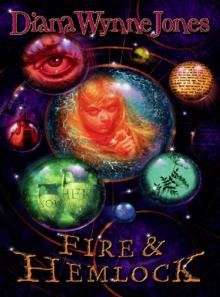 Fire and Hemlock
Fire and Hemlock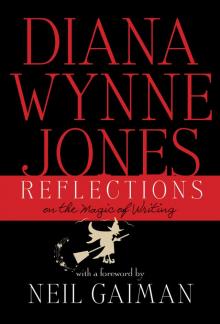 Reflections: On the Magic of Writing
Reflections: On the Magic of Writing The Game
The Game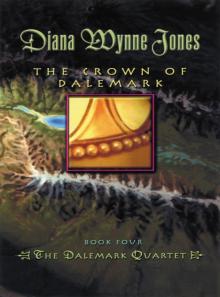 The Crown of Dalemark
The Crown of Dalemark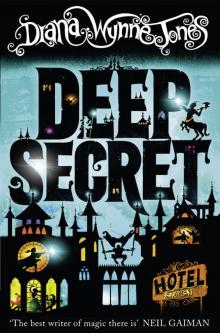 Deep Secret
Deep Secret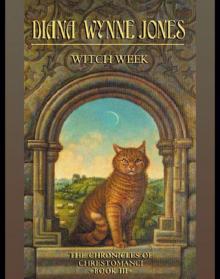 Witch Week
Witch Week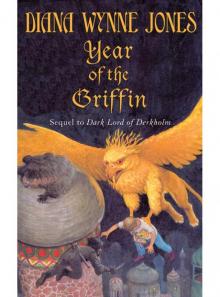 Year of the Griffin
Year of the Griffin Wild Robert
Wild Robert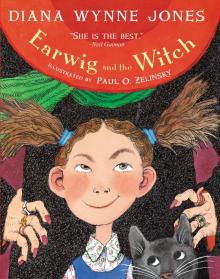 Earwig and the Witch
Earwig and the Witch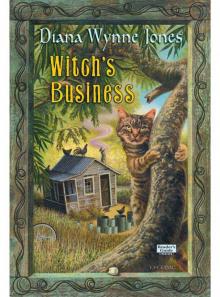 Witch's Business
Witch's Business Dogsbody
Dogsbody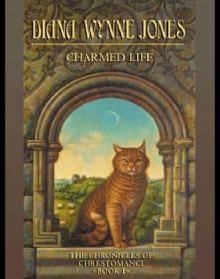 Caribbean Cruising
Caribbean Cruising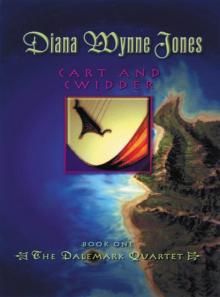 Cart and Cwidder
Cart and Cwidder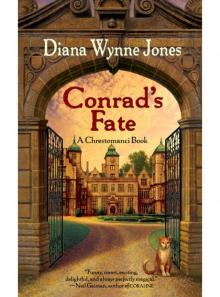 Conrad's Fate
Conrad's Fate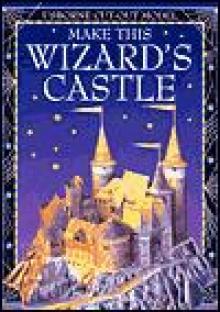 Howl's Moving Castle
Howl's Moving Castle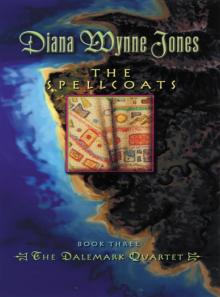 The Spellcoats
The Spellcoats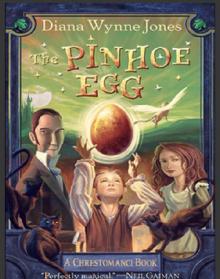 The Pinhoe Egg
The Pinhoe Egg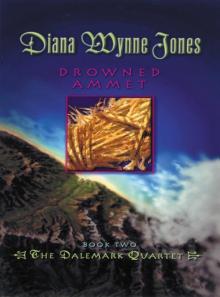 Drowned Ammet
Drowned Ammet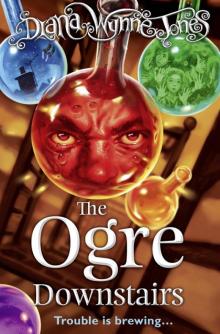 The Ogre Downstairs
The Ogre Downstairs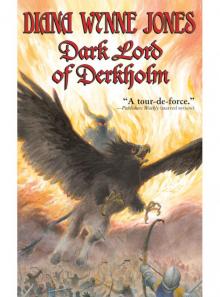 Dark Lord of Derkholm
Dark Lord of Derkholm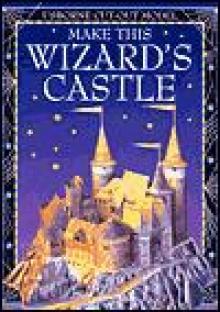 Castle in the Air
Castle in the Air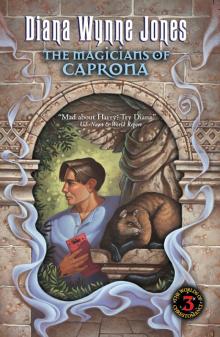 The Magicians of Caprona
The Magicians of Caprona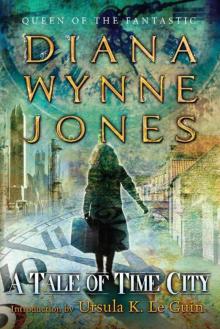 A Tale of Time City
A Tale of Time City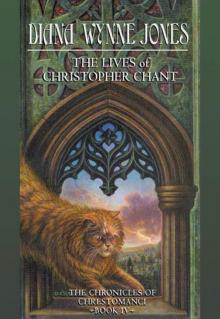 The Lives of Christopher Chant
The Lives of Christopher Chant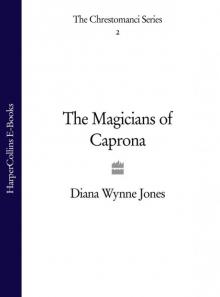 The Magicians of Caprona (UK)
The Magicians of Caprona (UK)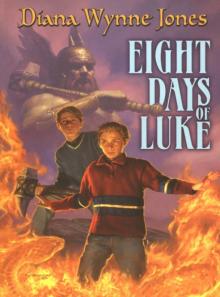 Eight Days of Luke
Eight Days of Luke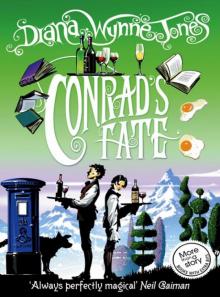 Conrad's Fate (UK)
Conrad's Fate (UK)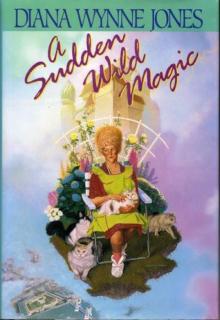 A Sudden Wild Magic
A Sudden Wild Magic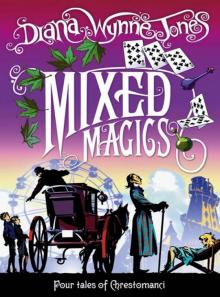 Mixed Magics (UK)
Mixed Magics (UK)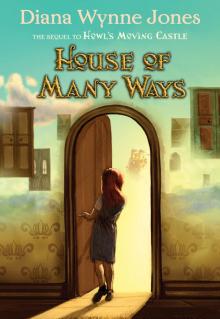 House of Many Ways
House of Many Ways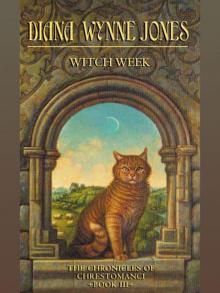 Witch Week (UK)
Witch Week (UK)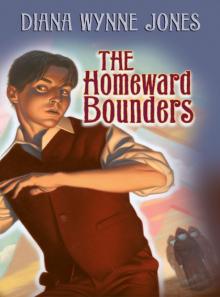 The Homeward Bounders
The Homeward Bounders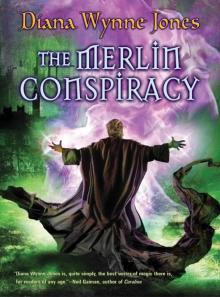 The Merlin Conspiracy
The Merlin Conspiracy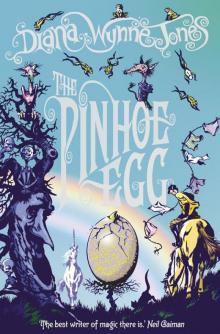 The Pinhoe Egg (UK)
The Pinhoe Egg (UK)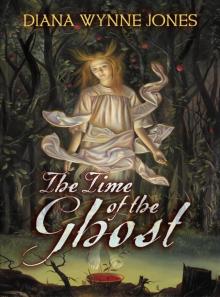 The Time of the Ghost
The Time of the Ghost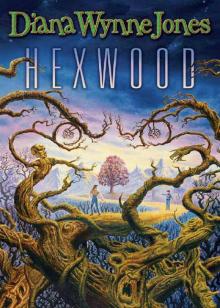 Hexwood
Hexwood Enchanted Glass
Enchanted Glass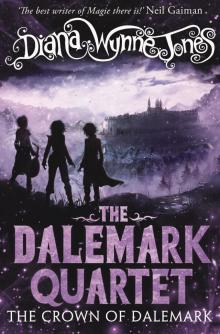 The Crown of Dalemark (UK)
The Crown of Dalemark (UK)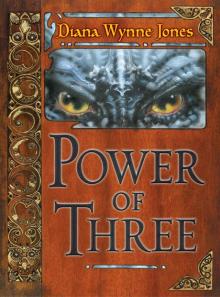 Power of Three
Power of Three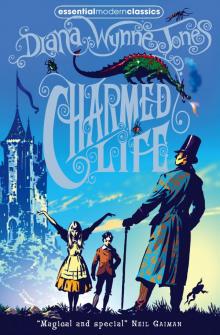 Charmed Life (UK)
Charmed Life (UK)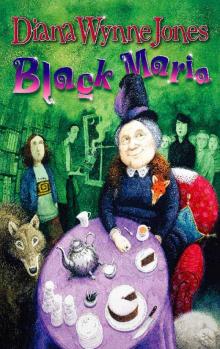 Black Maria
Black Maria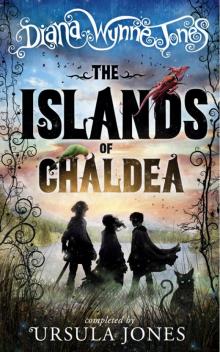 The Islands of Chaldea
The Islands of Chaldea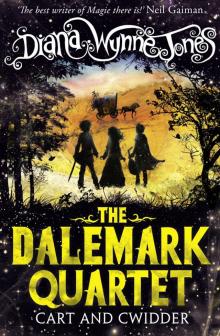 Cart and Cwidder (UK)
Cart and Cwidder (UK)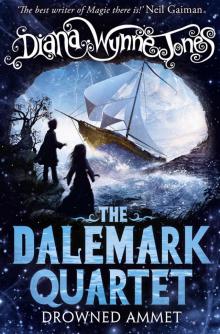 Drowned Ammet (UK)
Drowned Ammet (UK)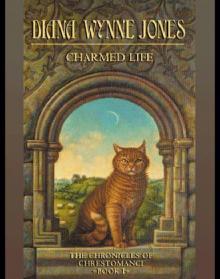 Charmed Life
Charmed Life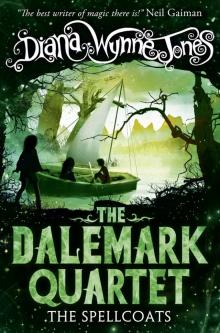 The Spellcoats (UK)
The Spellcoats (UK)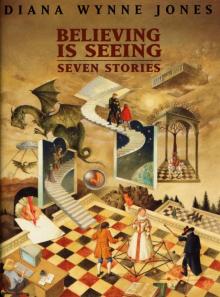 Believing Is Seeing
Believing Is Seeing Samantha's Diary
Samantha's Diary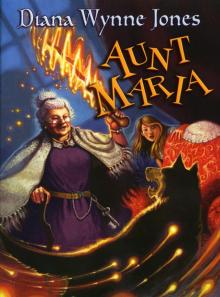 Aunt Maria
Aunt Maria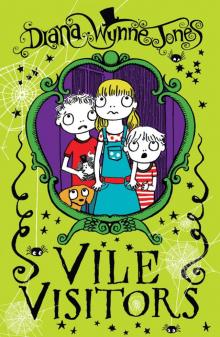 Vile Visitors
Vile Visitors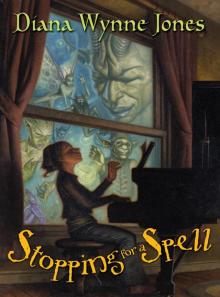 Stopping for a Spell
Stopping for a Spell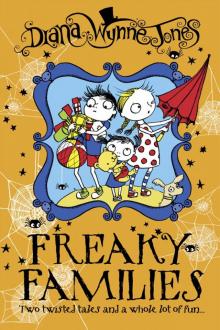 Freaky Families
Freaky Families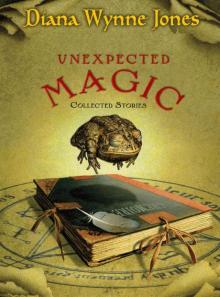 Unexpected Magic
Unexpected Magic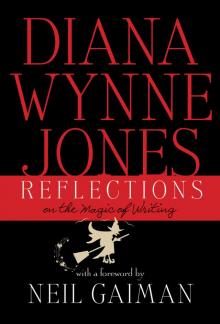 Reflections
Reflections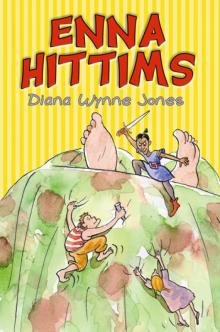 Enna Hittms
Enna Hittms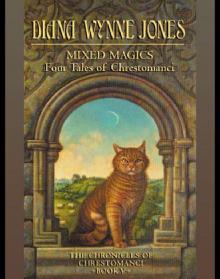 Mixed Magics: Four Tales of Chrestomanci
Mixed Magics: Four Tales of Chrestomanci